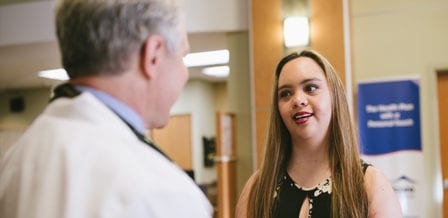IBCCES is the global leader in training and certification for healthcare professionals, educators and corporate partners who work with individuals with autism and other cognitive disorders. Our reach extends to more than 2 million people in all 50 states and over 70 countries around the globe. IBCCES Member Learning Community is provided as a free service to all IBCCES members who have completed one or more of our training and certification programs.
Pioneering Care for People with Down Syndrome
 This post was originally published on this site
This post was originally published on this site
From Down Syndrome World Issue 3 2018
As one of the lead authors of the Medical Care Guidelines for Adults with Down Syndrome, George T. Capone, M.D., is continuing his life’s work of improving evidence-based medical care for people with Down syndrome.
 FOR THE PAST 30 YEARS, George T. Capone, M.D., has specialized in providing quality care for patients with Down syndrome, always pushing for better evidence-based treatment and interventions. As a research scientist, Director of the Kennedy Krieger Institute’s Down Syndrome Clinic and Research Center (DSCRC), and Associate Professor of Pediatrics at the Johns Hopkins University School of Medicine, he has seen more than 2,500 patients, ranging in age from infants to seniors. Dr. Capone has contributed to improved care since the 1980s, and he continues to be concerned about health care for adults with Down syndrome.
FOR THE PAST 30 YEARS, George T. Capone, M.D., has specialized in providing quality care for patients with Down syndrome, always pushing for better evidence-based treatment and interventions. As a research scientist, Director of the Kennedy Krieger Institute’s Down Syndrome Clinic and Research Center (DSCRC), and Associate Professor of Pediatrics at the Johns Hopkins University School of Medicine, he has seen more than 2,500 patients, ranging in age from infants to seniors. Dr. Capone has contributed to improved care since the 1980s, and he continues to be concerned about health care for adults with Down syndrome.
Dr. Capone’s extensive knowledge, experience, and passion to improve care are the primary reasons he was tapped to join a team of physicians and researchers updating the Medical Care Guidelines for Adults with Down Syndrome, a project funded by the Global Down Syndrome Foundation.
AN EARLY SUPPORTER OF TRANSLATIONAL RESEARCH
Dr. Capone’s career treating people with Down syndrome took root in 1988, when he began a neurobiology fellowship at Johns Hopkins University School of Medicine. At the time, researchers at Johns Hopkins, including his mentor Joseph T. Coyle, M.D., were conducting groundbreaking genetic research on the link between Down syndrome and Alzheimer’s disease. Among the many projects he saw occurring in Dr. Coyle’s lab was research that used TS16 mouse models to investigate the impact that three copies of chromosome 21 — the defining characteristic of Down syndrome — has on early-onset Alzheimer’s disease. It was some of the earliest research on the subject.
The time spent in Dr. Coyle’s lab helped lay the foundation for Dr. Capone’s interest in how that research could be directly applied to the health and well-being of patients. In the early 1990s, Dr. Capone joined the Kennedy Krieger Institute. There, he recognized that the DSCRC provided ample opportunity to develop hypotheses and research questions on the neurobiological and neurobehavioral basis of cognitive impairment associated with Down syndrome. The clinic’s diverse patient population allowed for “person-centered clinical research focusing on the medical and mental health conditions we see on a daily basis.” Such research, he knew, would benefit not only people with Down syndrome but also patients with its co-occurring conditions, such as Alzheimer’s disease, sleep apnea, and heart conditions.
Under Dr. Capone’s leadership, the DSCRC has conducted studies on a range of conditions, including autism-spectrum disorders and attention-deficit/hyperactivity disorder. His research has led to the characterization of autism in children with Down syndrome, uncommon neurobehavioral and developmental profiles of children and teenagers with Down syndrome, and developmental regression in people of all ages with the condition.
He has also designed and conducted several clinical pharmacology trials for drugs intended to improve memory and cognition in both children and adults, including risperidone, guanfacine, and rivastigmine.
“The science is fascinating, and the associated medical conditions are complex and perplexing,” Dr. Capone said. “The families I work with are the best, and the children and adults I interact with always amaze me.”
FORGING NEW PATHS FOR ADULT MEDICAL CARE
Dr. Capone agrees that the increased knowledge and advocacy among parents and healthcare professionals, the establishment of specialized clinics such as the DSCRC, and advancements in medical-surgical care for children have all progressed health for people with Down syndrome. Yet, despite contributions to the field of care for people with Down syndrome, more research is necessary to improve lives.
“We need to better understand the etiology-pathogenesis and risk factors associated with certain medical conditions, as well as what treatment approaches and prevention strategies are most beneficial to our patients,” Dr. Capone explained. “We also need a more organized approach to managing data sets to improve clinical decision-making, patient and caretaker outcomes, and quality of life.”
The Medical Care Guidelines for Adults with Down Syndrome will go a long way toward improving clinical decision-making and health outcomes. The current guidelines available for adults with Down syndrome were last updated in 2001 and do not adequately reflect the more than doubling of life span for people with Down syndrome since the 1980s. As adults with Down syndrome are living longer, they require care specific to their unique aging experience and risk factors.
“Many physicians in adult medicine do not have adequate training to care for people with genetic and neurodevelopmental conditions,” Dr. Capone said. “The medical conditions experienced by adults with Down syndrome can appear overwhelming and beyond the reach of many physicians, but with sufficient resources and training, we can teach primary care and other adult healthcare providers how to provide this care with confidence.
“Coming up with medical care guidelines will expose how little we really know about ‘best practices’ when caring for aging adults with Down syndrome and chronic medical conditions,” he added. “I hope it will stimulate further interest and investigation into this often neglected aspect of clinical research.”
To learn more about the Medical Care Guidelines for Adults with Down Syndrome, please visit globaldownsyndrome.org/medical-care-guidelines.
ADVICE FOR FAMILIES AND SELF-ADVOCATES
George T. Capone, M.D., Director of the Down Syndrome Clinic and Research Center at Kennedy Krieger Institute and Associate Professor of Pediatrics at the Johns Hopkins University School of Medicine, has some advice, learned over a 30-year career, to pass along to people with Down syndrome and their families.
Don’t get caught up in comparisons.
“If your child seems different compared to other children you know with Down syndrome, don’t despair,” Dr. Capone said. “All our children are unique, and we should rejoice in these differences.”
Exercise body and mind.
“Stay physically and mentally active once you leave high school or post-secondary school,” he said. “Find your own means of self-expression through the performing arts, fitness, hobbies, and fun social activities.”
Connect.
“Stay informed and connected to the larger Down syndrome community of families and selfadvocates,” he advised.